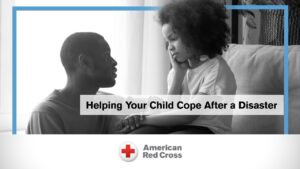Supporting Children During Stressful Times

By Sam Johnson Program Lead, Youth Preparedness, American Red Cross
Now more than ever, it’s critical we have open conversations with the children in our lives about situations that might make them feel nervous, worried or scared. The American Red Cross provides resilience and coping skills during their youth emergency preparedness programs that cover topics like hurricanes, wildfires, earthquakes, and many other hazards. With the ongoing stress of the COVID-19 pandemic and constant disruptions to school schedules and daily life, these resources can be applied and used, outside of the typical emergency and hazard conversations.
As a parent, caretaker and/or guardian, discussing what to expect when an emergency or potentially stressful situation occurs with a child beforehand can positively impact their ability to understand and react appropriately during an event. Doing so supports their overall resilience, which can improve their ability to recover after a stressful or scary situation.

One way to build a child’s resilience is to help them identify a potentially stressful situation, discuss the thoughts or feelings they might experience during and after an event, and how they might cope with them. The “Everybody Can Be A Superhero” animated video explains what an emergency is, who children can rely on to help them, and teaches them a coping skill to manage feelings of fear or anxiety.
The information in this short video reiterates the child can be a helper too if the people in their lives need support as well. This video is geared towards children ages 5-12 years old and is available in both English and Spanish.
Beyond understanding the tools that are available to build resilience in children, it’s crucial that parents, caretakers and/or guardians recognize children often begin to behave differently after a stressful situation as they try to figure out how to handle their emotions. The “Helping Your Child Cope After a Disaster” short video explains common behaviors a child may display after experiencing an emergency or stressful situation and outlines concrete actions one can take to best support a child’s recovery process.

Feeling worried or anxious themselves, adults often feel overwhelmed by their child’s changing behavior and don’t have the tools to care appropriately for them. This video provides an explanation of how to provide a child with the support they need and is available in both English and Spanish.
Through open conversations and developing coping skills, we can build resilience for our whole community. This then enables us to better face any emergency or stressful situation and improve our overall ability to recover. These resource and many others can be found on the Building Resilience in Children Though Coping Skills page at redcross.org/youthresilience
